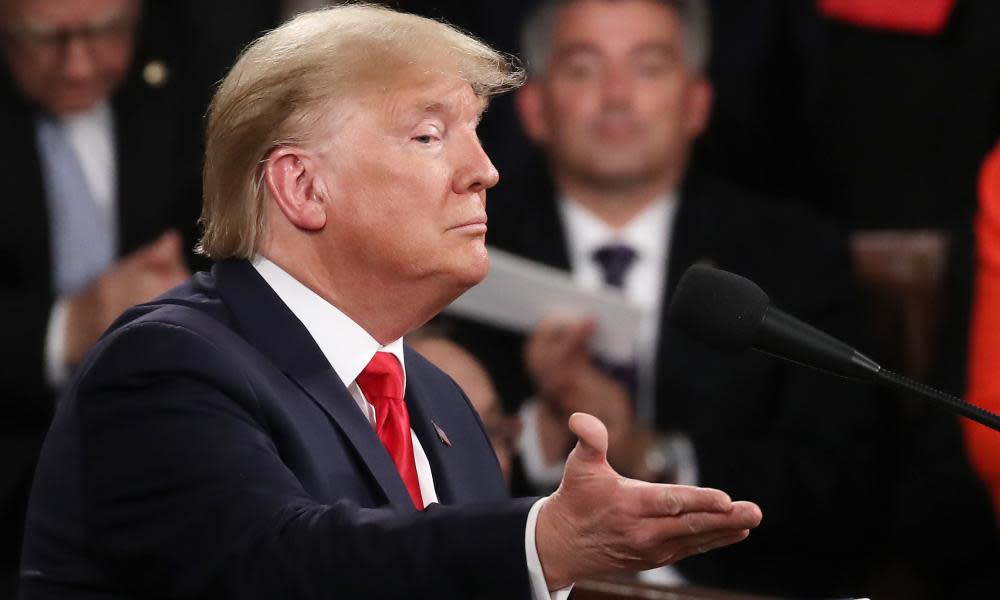The great escape: how Donald Trump survived impeachment

Will historians find Donald Trump’s impeachment remarkable because Republican politicians turned a blind eye to such egregious wrongdoing and acquitted him? Or will they find it remarkable because it was the last time a cadre of Republican officials publicly turned against Trump?
While most of the career civil servants who defied the president by testifying in the impeachment inquiry do not publicly identify as Republican, many were Trump appointees with strong Republican ties, while other key figures such as former national security adviser John Bolton are wizened party warriors.
In the end, only one elected Republican, Mitt Romney, voted against Trump, making the question of his ultimate survival of impeachment not even close. So, while Trump will forever be an impeached president, his acquittal should count as a major political win. Here’s how it went down:
The base stuck with him
In a string of speeches this week, Republican senators have explained their votes to acquit Trump by impugning the strength of the Democratic case, repeating quibbles with the process in the House of Representatives, and expressing offense at various things the impeachment managers or top Democrats said or did.
But did Trump really avoid removal because the House speaker, Nancy Pelosi, passed out pens after the articles of impeachment were signed, or because the lead impeachment manager, Adam Schiff, made reference to a news story about senators’ heads on pikes?
A more likely explanation for Trump’s survival was the unchanging opposition of the Republican base to removal. The proportion of Republicans favoring removal fluctuated between 8% and 10%, while support for removal among Independents was likewise stationary at around 42%, according to FiveThirtyEight. That wasn’t enough pressure to get lawmakers’ attention.
Elected Republicans stayed in line
Where the base goes, the elected politicians shall follow, and in this case the base went nowhere. And so elected Republicans went nowhere, with the exception of Romney, supporting Trump from (Senator Lamar) Alexander to (Representative Lee) Zeldin.
The Senate majority leader, Mitch McConnell, Lindsey Graham and others said before the trial that they would not be impartial jurors, despite a sworn oath of impartiality they took as the trial began. Against such loyalty to Trump, what piece of evidence or argument could be expected to make a dent?
In some cases, the extent of Republicans’ defense of Trump seemed to exceed what was strictly necessary to protect the president from removal. Instead of questioning witnesses, Republicans in the House wove conspiracy theories about Hunter Biden. Instead of calling witnesses, Republicans in the Senate discoursed at length on the sheer impossibility of knowing what Trump was thinking when he withheld aid to Ukraine.
The Senate is broken
From the dust of Democratic losses in the 2014 midterm elections halfway through Barack Obama’s second term rose a new Senate majority leader, McConnell, who cruised in with a 10-seat majority on sub-basement turnout.
In the two US Senate election years since then, Democratic candidates have attracted a whopping 29 million more votes than Republican candidates – but the Republican majority has shrunk by only a couple of seats. That’s because each state gets two senators no matter how few people live there.
In short, the US Senate is not representative of the country, which as a whole favored the introduction of witnesses and documents at the trial, a step blocked by Republicans.
Mind-blowing stat: 48 Senators who voted to convict Trump represent 18 million more Americans than 52 Republicans who voted to acquit
— Ari Berman (@AriBerman) February 5, 2020
No thanks to Schiff
Whatever factors Trump can point to that aided his survival in office, not on the list is the performance of the House impeachment managers, led by the intelligence committee chair Schiff.
As soon as Democrats realized the White House was trying to prevent a whistleblower complaint from reaching Congress, Schiff opened the investigation that Pelosi deemed a formal impeachment inquiry on 24 September. Over the next four-plus months, Democrats fought against a blanket gag imposed by Trump to gather evidence and bring the details of the case to the public.
After Trump ordered his administration to refuse to comply with subpoenas, Republicans faulted Democrats for failing to gather evidence. After lawyers for Bolton threatened the House with a lawsuit if he were subpoenaed, Republicans faulted Democrats for not issuing the subpoena.
Against each obstacle, the managers and staff worked forward, conducting depositions, holding public hearings, issuing public reports and finally prosecuting the case in the Senate well. At trial, Schiff in particular anthologized the facts against Trump to weave damning accounts of the president’s conduct.
However, Trump will claim victory at having escaped removal, the case against him is in the can.

